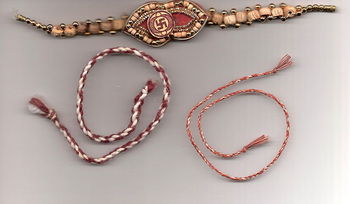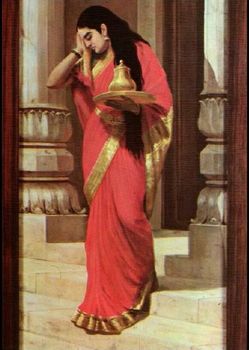Raksha Bandhan
Raksha Bandhan (in Hindi "the bond of protection") is a Hindu festival celebrating the relationship between brothers and sisters. It is organized on the full moon of month Shraavana. Usually it is sometime in August. In 2014 the festival is held on the 10th of August.
In the north and northwest of India this holiday is called Rakhi Purnima. The word purnima means a "full moon".
Preparations start before the full moon ("purnima"). The sisters prepare the "thali" (selection of different things) for the "poojan" (worship, ritual). The thali includes the rakhi threads, kumkum powder, rice, diya (a lamp used in rituals), agarbattis (incense sticks) and some sweets.
 Rakhis - holy threads
Rakhis - holy threads
On Raksha bandhan offerings are made to the family dieties. Then sister perfroms Hindu ritual song Aarti or Arti and ties a rakhi or holy thread on the whrist of her brother. She also puts kumkum powder on the forehead of her brother and makes a mark known as "tilaka" or "tilak".
During the above mentioned rituals the sister chants.
"Suraj shakhan chhodian, Mooli chhodia beej
Behen ne rakhi bandhi / Bhai tu chir jug jee"
Or in English.
"The sun radiates its sunlight, the radish spreads its seeds,
I tie the rakhi to you O brother and wish that may you live long".
He promises to look after her no matter what happens. The brother then gives her sister a present to mark the occasion. The presents include clothes, dry fruit or something similar.
Nowadays traditional rakhis are in many cases replaced by wrist watches and silver or gold bracelets.
Any male, being a friend or cousin, can be "adopted" as brother by tying a rakhi.
There are many examples in the Indian history where the woman ask for a protection through rakhi from a man who is not her brother.
Princess Rani Karnavati of Chittor experienced severe danger from Bahadur Shah of Gujarat. So, she sent a rakhi to the Mughal Emperor Humayun. He was in the middle of battle, but he left it and arrived to help her.
Rakhi can be a present in the world of politics, and not only among brothers and sisters. In Indian independence movement rakhi was a sign of solidarity and kinship.
Where are the origins of Raksha bandhan festival? There are two basic opinions.
The first one includes Indra, the king of devtas (gods) and the asura (demon) Vritra. Vritra occupied Indra's kingdom. Before the battle in which Indra tried to liberate the kingdom his wife Shachi, on request of her guru Brihaspati, tied a thread around her husband's wrist to secure his victory.
The second opinion includes Shishupal and Krishna. Shishupal was a son of Damaghosha, king of Chedi. Krishna was his enemy. He thought that Krishna stole his indented wife Rukmini. Krishna killed Shishupal at great sacrifice of Yudhishthira. Krishna was left with a bleeding finger. Draupadi, the wife of five Pandavas, had torn a strip of silk off her sari and tied it around Krishna's wrist to stop the flow of blood. Krishna was so touched by Draupadi's action. He promised to help her in the future.
 Draupadi, the wife of the five Pandavas
Draupadi, the wife of the five Pandavas
One day Draupadi was disgraced in front of the whole court by her brother-in-law Duryodhana. She asked Krishna for help. He helped her by divinely extending the length her sari so it could not be removed by Duryodhana who wanted to humiliate her by taking off the sari.
Raksha Bandhan is celebrated all over India. Certainly the way it is celebrated vary.
In west of India and in parts of Indian states Maharashtra, Gujarat, and Goa people call it Nariyal Purnima. As a way to honour the Lord Varuna, the God of the Sea local people make an offering of a coconut ("nariyal") to the sea. Many of them are fishermen and they hope that Varuna will help them to catch lot of fish.
On the day of Raksha Bandhan Brahmin community in the Indian states of Kerala, Andhra Pradesh, Tamil Nadu, Maharashtra and Orissa celebrate Avani Avittam.
In the state Karnataka, located in the south of India, the followers of Yajurveda celebrate Upakarma (Upakarman) as the start of Vedic studies. On this day they change their sacred thread or yajnopavitam.
In central Indian states of Madhya Pradesh, Chattisgarh, Jharkand and Bihar Kajari Purma is celebrated. Kajari Purma is important for farmers and women who have sons. Preparations for this festival start on the ninth day after Shravana Amavasya. This day is called Kajari Navami. From this day until the Kajri Purnima or the full moon day women perform different rituals.
In parts of Gujarat state located in the west of India people celebrate Pavitropana. On this day people perform the grand pooja (puja) or the worship of Lord Shiva.